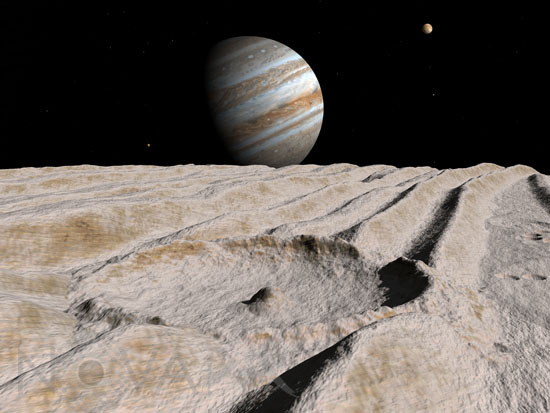Photo Agency - Astronomy - Space - Nature

Ridges, grooves, and craters on Ganymede
author: Walter B. Myers/Novapix
reference: a-jup99-00053
Image Size 300 DPI: 34 * 25 cm
Jupiter's largest satellite Ganymede has a varying surface, some of which is characterized by rumpled bundles of ridges and grooves that run for hundreds of miles over a frozen surface of water-ice. They probably formed long ago when tectonic forces pulled apart Ganymede's upper crust; similar sets of faults occur in rift zones on Earth, as in eastern Africa. Subsequent meteoritic impacts have peppered--and broken in places--the continuity of the running formations.
In this image an impact crater about 10 miles in diameter dominates a scene otherwise defined by a dozen long ridges. In the middle of the crater is a central peak, formed when the energy of the impact liquefied the crust long enough for it to rebound upward and solidify once again.
Immediately above the horizon, Jupiter is still a majestic spectacle, even at a distance of nearly three times that between the Earth and its moon. Much closer on the upper right is Ganymede's sister satellite Europa. At a distance of 307 thousand miles from this vantage point, Europe is only a quarter again as far as the Earth is from its moon. To the lower left of Jupiter at nearly a million miles is Jupiter's volcanic satellite Io.
Keywords for this photo:
ASTRONOMY - EUROPA - GALILEAN SATELLITE - GANYMEDE - ILLUSTRATION - IMPACT CRATER - IO - JOVIAN MOON - JUPITER - PLANET - SATELLITE -
Contact : Stéphane Aubin +33-(0)9-51-26-53-76
© Novapix - All rights reserved


